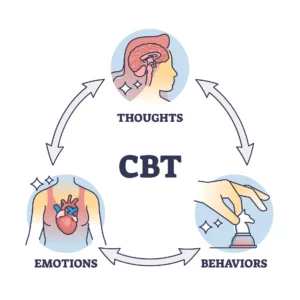Harnessing the Power of CBT for Eating Disorders Treatment

Eating disorders, complex conditions characterized by unhealthy eating behaviors and thought patterns, require an equally sophisticated approach to treatment. Cognitive Behavioral Therapy (CBT) has emerged as a leading modality in this realm, offering a structured, evidence-based pathway to overcoming eating disorders. This comprehensive guide delves into the effectiveness of CBT in treating eating disorders and explores additional therapeutic modalities that can complement this approach.
Understanding Cognitive Behavioral Therapy for Eating Disorders
- CBT’s Foundations: CBT is based on the understanding that our thoughts, feelings, and behaviors are interconnected. In the context of eating disorders, it addresses distorted thoughts and beliefs about food, body image, and self-worth that drive harmful eating behaviors.
- Structured Approach: CBT involves a series of structured sessions where individuals learn to identify and challenge negative thought patterns and replace them with healthier, more realistic ones.
- Skills for Long-term Management: CBT equips individuals with practical skills to manage triggers and prevent relapse, focusing on long-term recovery rather than just symptom relief.
The Clinical Effectiveness of CBT for Eating Disorders
- Research-Backed Results: Studies consistently show that CBT is one of the most effective treatments for eating disorders, particularly for conditions like bulimia nervosa and binge eating disorder.
- Personalized Treatment Plans: CBT is tailored to each individual’s specific needs and challenges, making it a versatile tool in treating a range of eating disorders.
The Therapeutic Process of CBT
- Identifying Triggers: Individuals learn to recognize situations or emotions that trigger disordered eating behaviors.
- Cognitive Restructuring: A key component of CBT, cognitive restructuring involves changing harmful thought patterns and beliefs about food and body image.
- Behavioral Experiments: CBT often includes behavioral experiments where individuals test their beliefs in real-world scenarios, helping to reduce fear and anxiety around food
The Role of Support Systems in CBT for Eating Disorders
An often underemphasized yet crucial aspect of CBT in eating disorder treatment is the role of support systems. Recovery is not just an individual journey; it flourishes with the support of a compassionate community. Family involvement, peer support groups, and consistent interaction with healthcare professionals can significantly bolster the efficacy of CBT. Family therapy sessions integrated with CBT can educate loved ones about the disorder, enabling them to provide effective support. Similarly, support groups offer a platform for shared experiences and collective wisdom, providing individuals with a sense of belonging and understanding that they are not alone in their struggles. Regular consultations with dietitians, therapists, and medical professionals ensure that the treatment remains dynamic and responsive to the individual’s evolving needs. This supportive network not only reinforces the learning from CBT sessions but also creates an environment of empathy and encouragement, essential for sustained recovery. Embracing a support system transforms the journey from a solitary fight against eating disorders into a collaborative effort towards health and well-being.
Complementary Therapies in Eating Disorder Treatment
While CBT is highly effective, combining it with other therapeutic modalities can enhance treatment outcomes:
- Dialectical Behavior Therapy (DBT): DBT emphasizes mindfulness and emotional regulation, which can be particularly beneficial for individuals who experience intense emotions or impulsive behaviors.
- Narrative Therapy: This approach allows individuals to reshape their personal narratives, helping them see their eating disorder as a separate entity from themselves, which can be empowering and liberating.
- Holistic and Integrated Approaches: Incorporating a range of therapies can address the multifaceted nature of eating disorders, catering to the emotional, psychological, and physical aspects of recovery.
Embracing a Multifaceted Approach to Recovery
While CBT stands out for its effectiveness in treating eating disorders, an integrated approach that includes modalities like DBT and narrative therapy can offer a more comprehensive pathway to healing. By addressing the complexities of eating disorders from multiple angles, individuals can embark on a more holistic and sustainable journey to recovery. Book here to connect about a call to see how I can help you with your eating disorder

